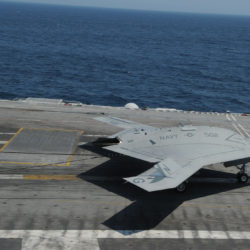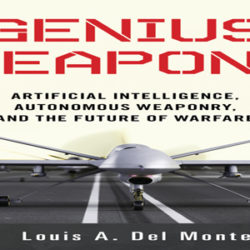Amherst, NY (November 6, 2018) – The first book in its genre, Genius Weapons: Artificial Intelligence, Autonomous Weaponry, and the Future of Warfare (Prometheus Books, November 6, 2018) by Louis A. Del Monte, delineates the new arms race between the United States, China, and Russia to develop genius weapons, weapons whose artificial intelligence greatly exceeds human intelligence and the destructive force of nuclear weapons.
Artificial intelligence is playing an ever-increasing role in military weapon systems. The Pentagon is now in a race with China and Russia to develop “lethal autonomous weapon systems” (LAWS). In this eye-opening overview, a physicist, technology expert, and former Honeywell executive examines the advantages and the potential threats to humanity resulting from the deployment of weapons guided by superintelligent computers (i.e., genius weapons). Stressing the likelihood that these weapons will be available in the coming decades since no treaty regulates their development and deployment, the author examines the future of warfare and the potential for genius weapons to initiate a war that threatens the extinction of humanity.
“A highly readable and deeply researched exploration of one of the most chilling aspects of the development of artificial intelligence: the creation of intelligent, autonomous killing machines. In Louis A. Del Monte’s view, the multibillion dollar arms industry and longstanding rivalries among nations make the creation of autonomous weapons extremely likely,” said James Barrat, author of Our Final Invention: Artificial Intelligence and the End of the Human Era.
In his insightful and prescient account of genius weapons, Del Monte uses vivid scenarios that immerse the reader in the ethical dilemmas and existential threats posed by these weapons. Based on hard science and political realities, the book warns that the dystopian visions of such movies as The Terminator and I, Robot may become a frightening reality in the future. The author concludes with concrete recommendations, founded in historical precedent, to control this new arms race.
Mr. Del Monte is available for interviews. You may contact him by phone at (952) 261-4532, or by email at ldelmonte@delmonteagency.com.
Louis A. Del Monte is an award-winning physicist, author, inventor, futurist, featured speaker, and CEO of Del Monte and Associates, Inc. For over thirty years, he was a leader in the development of microelectronics and microelectromechanical systems (MEMS) for IBM and Honeywell. As a Honeywell Executive Director from 1982 to 2001, he led hundreds of physicists, engineers, and technology professionals engaged in integrated circuit and sensor technology development for both Department of Defense (DOD) and commercial applications. He is literally a man whose career has changed the way we work, play, and make war. Del Monte is the recipient of the H.W. Sweatt Award for scientific engineering achievement and the Lund Award for management excellence. He is the author of international bestsellers like Nanoweapons and The Artificial Intelligence Revolution. He has been quoted or has published articles in the Huffington Post, the Atlantic, Business Insider, American Security Today, Inc., and on CNBC. He has appeared on the History Channel.
Amherst, NY (November 6, 2018) – The first book in its genre, Genius Weapons: Artificial Intelligence, Autonomous Weaponry, and the Future of Warfare (Prometheus Books, November 6, 2018) by Louis A. Del Monte, delineates the new arms race between the United States, China, and Russia to develop genius weapons, weapons whose artificial intelligence greatly exceeds human intelligence and the destructive force of nuclear weapons.
Artificial intelligence is playing an ever-increasing role in military weapon systems. The Pentagon is now in a race with China and Russia to develop “lethal autonomous weapon systems” (LAWS). In this eye-opening overview, a physicist, technology expert, and former Honeywell executive examines the advantages and the potential threats to humanity resulting from the deployment of weapons guided by superintelligent computers (i.e., genius weapons). Stressing the likelihood that these weapons will be available in the coming decades since no treaty regulates their development and deployment, the author examines the future of warfare and the potential for genius weapons to initiate a war that threatens the extinction of humanity.
“A highly readable and deeply researched exploration of one of the most chilling aspects of the development of artificial intelligence: the creation of intelligent, autonomous killing machines. In Louis A. Del Monte’s view, the multibillion dollar arms industry and longstanding rivalries among nations make the creation of autonomous weapons extremely likely,” said James Barrat, author of Our Final Invention: Artificial Intelligence and the End of the Human Era.
In his insightful and prescient account of genius weapons, Del Monte uses vivid scenarios that immerse the reader in the ethical dilemmas and existential threats posed by these weapons. Based on hard science and political realities, the book warns that the dystopian visions of such movies as The Terminator and I, Robot may become a frightening reality in the future. The author concludes with concrete recommendations, founded in historical precedent, to control this new arms race.
Mr. Del Monte is available for interviews. You may contact him by phone at (952) 261-4532, or by email at ldelmonte@delmonteagency.com.
Louis A. Del Monte is an award-winning physicist, author, inventor, futurist, featured speaker, and CEO of Del Monte and Associates, Inc. For over thirty years, he was a leader in the development of microelectronics and microelectromechanical systems (MEMS) for IBM and Honeywell. As a Honeywell Executive Director from 1982 to 2001, he led hundreds of physicists, engineers, and technology professionals engaged in integrated circuit and sensor technology development for both Department of Defense (DOD) and commercial applications. He is literally a man whose career has changed the way we work, play, and make war. Del Monte is the recipient of the H.W. Sweatt Award for scientific engineering achievement and the Lund Award for management excellence. He is the author of international bestsellers like Nanoweapons and The Artificial Intelligence Revolution. He has been quoted or has published articles in the Huffington Post, the Atlantic, Business Insider, American Security Today, Inc., and on CNBC. He has appeared on the History Channel.




